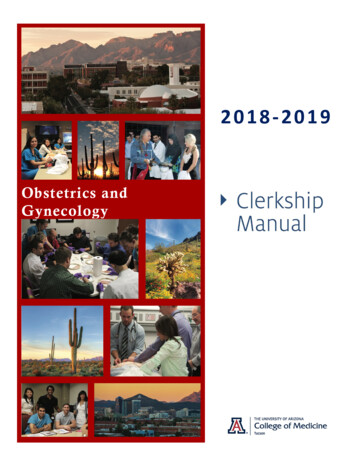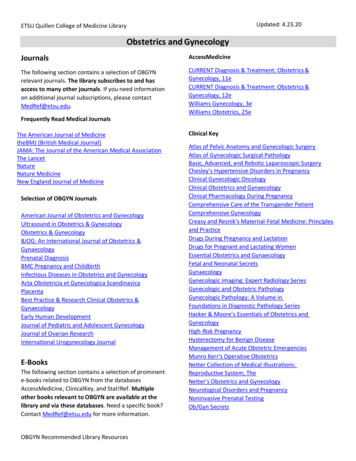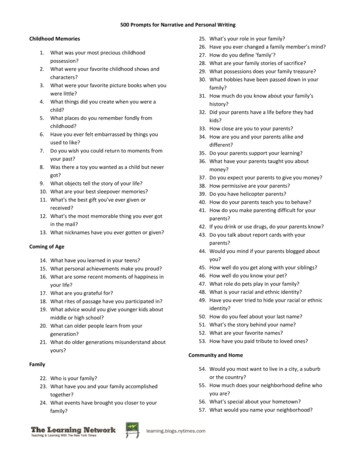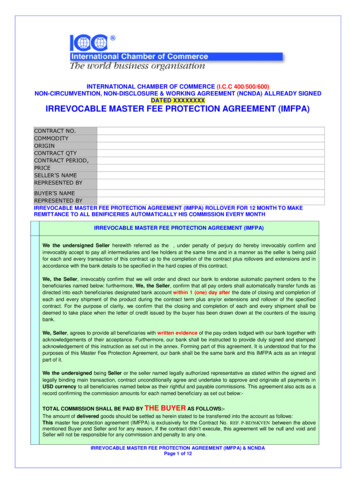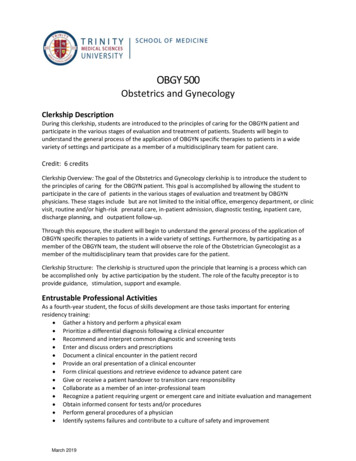
Transcription
OBGY 500Obstetrics and GynecologyClerkship DescriptionDuring this clerkship, students are introduced to the principles of caring for the OBGYN patient andparticipate in the various stages of evaluation and treatment of patients. Students will begin tounderstand the general process of the application of OBGYN specific therapies to patients in a widevariety of settings and participate as a member of a multidisciplinary team for patient care.Credit: 6 creditsClerkship Overview: The goal of the Obstetrics and Gynecology clerkship is to introduce the student tothe principles of caring for the OBGYN patient. This goal is accomplished by allowing the student toparticipate in the care of patients in the various stages of evaluation and treatment by OBGYNphysicians. These stages include but are not limited to the initial office, emergency department, or clinicvisit, routine and/or high-risk prenatal care, in-patient admission, diagnostic testing, inpatient care,discharge planning, and outpatient follow-up.Through this exposure, the student will begin to understand the general process of the application ofOBGYN specific therapies to patients in a wide variety of settings. Furthermore, by participating as amember of the OBGYN team, the student will observe the role of the Obstetrician Gynecologist as amember of the multidisciplinary team that provides care for the patient.Clerkship Structure: The clerkship is structured upon the principle that learning is a process which canbe accomplished only by active participation by the student. The role of the faculty preceptor is toprovide guidance, stimulation, support and example.Entrustable Professional ActivitiesAs a fourth-year student, the focus of skills development are those tasks important for enteringresidency training: Gather a history and perform a physical exam Prioritize a differential diagnosis following a clinical encounter Recommend and interpret common diagnostic and screening tests Enter and discuss orders and prescriptions Document a clinical encounter in the patient record Provide an oral presentation of a clinical encounter Form clinical questions and retrieve evidence to advance patent care Give or receive a patient handover to transition care responsibility Collaborate as a member of an inter-professional team Recognize a patient requiring urgent or emergent care and initiate evaluation and management Obtain informed consent for tests and/or procedures Perform general procedures of a physician Identify systems failures and contribute to a culture of safety and improvementMarch 2019
General Clerkship ObjectivesMedical Knowledge Understand the physiology of the female pelvic anatomy with an emphasis on reproductivedevelopment and changes in endocrinology across a woman’s lifespan Acquire a comprehensive understanding of primary and preventive care for women across thelifespan with appropriate screening tests, exams, and treatments at each stage Develop an evidenced-based understanding of the pathophysiology of conditions and commondisorders that affect women, tests to diagnose, and the appropriate management options forthese conditions Understand the course of a normal pregnancy and effective healthcare during pregnancy toensure the health of the mother and fetus Understand the proper management of labor and delivery and the management of commonmedical complications that occur during and after pregnancy Recognize common obstetric and gynecological surgical procedures in terms of patientselection, pre-operative concerns, and the risks and benefits for each procedurePatient Care Demonstrate the initial development of the clinical skills required for women’s routine healthmaintenance including: taking an effective history and physical, developing a differentialdiagnosis, and developing a management plan for common disorders and conditions Demonstrate the initial development of the clinical skills required for providing appropriateassistance in the OR for gynecological surgeries and C-sections Evaluate surgical patients pre-operatively and post-operatively in terms of commoncomplications and explain proper management of these complications Demonstrate the ability to provide non-directive counseling to patients regarding pregnancyoptions and various methods of contraception with their benefits and risks Demonstrate the ability to assess the health of the mother and fetus health during pregnancyand labor and demonstrate the proper technique for delivering the babyInterpersonal and Communication Skills Contribute to effective teamwork by communicating with the healthcare team in a timely,thorough, and accurate manner Document patient information with logically organized, concise, accurate written notes Develop patient-centered communication skills to effectively convey healthcare information topatients Use a respectful non-aggressive manner in counseling patients regarding life style choices thatcontribute to optimal healthProfessionalism Accomplish tasks in a way that demonstrates that patient well-being is always paramount Demonstrate professionalism by interacting respectfully with the healthcare team,patients and families regardless of differing beliefs, culture or status Develop management plans for patients considering the physical, emotional, social andfinancial costs that the condition and its treatment impose on the patient Take responsibility for accomplishing assigned tasks in an effective and punctualmanner Demonstrate trustworthiness by maintaining patient confidentiality at all timesSystems-Based Practice Recognize hospital and community resources available to support quality patient care Understand how multiple systems – hospitals, insurance carriers, governmentMarch 2019
agencies - often intersect in the clinical setting to impact patient careDocument the major public health issues impacting women's health care todayRecognize the effect social and cultural factors have on the provision of quality patient careDemonstrate the ability to be an effective team member by assuming an appropriaterole in any clinical situation in order to support quality patient carePractice-Based Learning Demonstrate a commitment to lifelong learning by using evidence-based resources to betterunderstand the condition and treatment of patients under your care Use instructional feedback from the faculty, residents, and healthcare professionals as a tool toimprove performance as a medical student Reflect on your performance as a medical student and identify individual learning goals toaccelerate your development as a physicianExpected Skills for Obstetrics and Gynecology ClerkshipIntroduced/practiced Give/receive patient handoverExpected to perform History and physicalHistory of present illnessObtain past medical historyObtain family historyObtain personal and social historyReview of systemsObtain vital signsPatient presentationFocused Exam (H&N, ENT,cardiovascular/respiratory, gynecologic,breast exam)Fundoscopy GlovingSuturingDifferential diagnosisInterpret lab tests, imaging studies,basic EKGDiscuss orders/prescriptionsAssist with deliveryFormulate treatment planDemonstrate evidence-based medicineCollaborate as a team memberDemonstrate appropriate behaviors of aphysicianTextbooks and ResourcesHorsager R, SW Roberts, VL Rogers, PC Santiago-Munoz, KC Worley. 2014. Williams Obstetrics StudyGuide, 24th edition. McGraw-Hill Publishers [ISBN-13: 978-0071793278, ISBN-10: 0071793275]Werner CL, DL Richardson, SY Chang, WF Griffith, C Hamid, et al. 2016. Williams Gynecology StudyGuide, 3rd edition. McGraw Hill Publishers [ISMB-13: 978-0071849944, ISBN-10: 9780071849944]Toy EC, JT PJ Ross, B Baker, J Jennings. 2016. Case Files Obstetrics and Gynecology, 5th edition. McGrawHill Lange Publishers [ISBN-13: 978-0071848725 ISBN-10: 007184872X].Students have access to online reference resources through the Trinity Medical Sciences UniversityLibrary and Access Medicine. Medical libraries and other learning resources are available at all hospitalbased clerkship sites. Students also have access to the comprehensive Kaplan Step 2 CK preparatorymaterials which include lecture notes and instructional videos.EvaluationThe evaluation will include the entrustable professional activities. The Obstetrics and Gynecologypreceptor will evaluate the following.EPA 1: Gather history and perform a physical examinationMarch 2019
EPA 2: Prioritize a differential diagnosisEPA 3: Recommend and interpret common diagnostic and screening testsEPA 4: Enter or discuss orders and prescriptionsEPA 5: Document a clinical encounter in the patient recordEPA 6: Provide an oral presentation of a clinical encounterEPA 8: Give or receive a patient handover to transition care responsibilityEPA 9: Collaborate as a member of an inter-professional teamEPA 10: Recognize a patient requiring urgent or emergent care and initiate evaluation andmanagementEPA 13: Identify systems failures and contribute to a culture of safety and improvementGRADESCore clerkships are graded Pass, High Pass, Honors, and Fail. Components of the final grade include: Evaluations (mid-clerkship, final, student) Case Logs (NI) Patient Encounters Attendance NBME Shelf ScoreA student who does not pass the NBME shelf exam will receive an Incomplete in the clerkship. See theClerkship Manual for additional information.POLICIESFor a complete discussion of clerkship policies, refer to the Clerkship Manual and the University Catalogand Student Handbook.STUDENT GRIEVANCE POLICYTrinity Medical Sciences University (TMSU) is committed to treating all members of the academiccommunity fairly with regard to their personal and professional concerns. The student complaint policyand procedure ensure that concerns are promptly dealt with and resolutions reached in a fair and justmanner. The University’s procedure enables students to bring complaints and problems to the attentionof the TMSU’s administration.A grievance is a complaint arising by an action by an individual and may include, but are not limited to thefollowing: Academic programs or courses Discrimination General mistreatment Harassment, including sexual violence Mentoring Privacy of student educational records Privacy of student health records Security and safety Research Student healthThe process for filing a grievance is found in the Clerkship Manual and the University Catalog andStudent Handbook. For additional questions and guidance, contact the Sr. Associate Dean for ClinicalClerkships or the Associate Dean for Admissions and Student Affairs. TMSU forbids any retaliatory actionagainst students who present concerns and complaints “in good faith”March 2019
ATTENDANCE POLICYStudents are expected to be present (and early) at clerkship sites as scheduled by the preceptor. Nightcall, weekend coverage, and holiday assignments may be included. Absences, for any reason, must bereported immediately to the Clerkship Administrator and preceptor. Absences may have disciplinaryactions if not reported as outlined in the Clerkship Manual and by the preceptor.CONDUCTThe University expects all students to be responsible individuals who possess the highest standards ofintegrity, honesty and personal conduct. These traits are prerequisites to independent learning,professional development, the successful performance of academic and clinical assignments, and theconduct of one’s personal life. Accordingly, students are expected to adhere to a standard of behaviorconsistent with the University’s high standards at all times off and on campus. Compliance withinstitutional rules and regulations, in addition to city, state and federal laws, is expected.Trinity School of Medicine Faculty Contact InformationMarc Zubrow, MD mzubrow@trinityschoolofmedicine.orgFrances Jack-Edwards, MD fjack@trinityschoolofmedicine.orgMarch 2019
OBGYN specific therapies to patients in a wide variety of settings. Furthermore, by participating as a member of the OBGYN team, the student will observe the role of the Obstetrician Gynecologist as a member of the multidisciplinary team that provides care for the patient. Clerkship Structure: The clerkship is structured upon the principle that learning is a process which can be accomplished .
